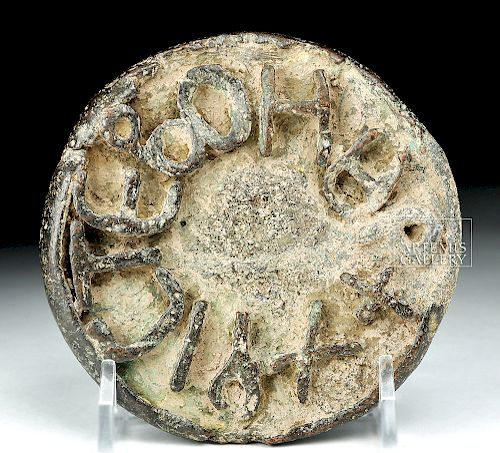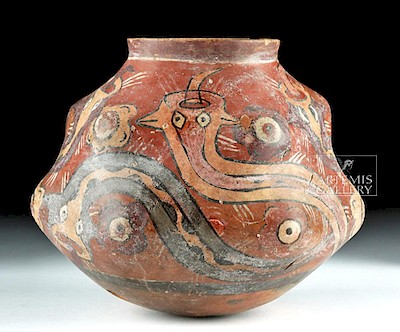Early Byzantine Bronze Discoid Bread Stamp
Lot 90
About Seller
Artemis Gallery
686 S Taylor Ave, Ste 106
Louisville, CO 80027
United States
Selling antiquities, ancient and ethnographic art online since 1993, Artemis Gallery specializes in Classical Antiquities (Egyptian, Greek, Roman, Near Eastern), Asian, Pre-Columbian, African / Tribal / Oceanographic art. Our extensive inventory includes pottery, stone, metal, wood, glass and textil...Read more
Categories
Estimate:
$1,100 - $1,650
Absentee vs Live bid
Two ways to bid:
- Leave a max absentee bid and the platform will bid on your behalf up to your maximum bid during the live auction.
- Bid live during the auction and your bids will be submitted real-time to the auctioneer.
Bid Increments
| Price | Bid Increment |
|---|---|
| $0 | $25 |
| $300 | $50 |
| $1,000 | $100 |
| $2,000 | $250 |
| $5,000 | $500 |
| $10,000 | $1,000 |
| $20,000 | $2,500 |
| $50,000 | $5,000 |
| $100,000 | $10,000 |
| $200,000 | $20,000 |
About Auction
By Artemis Gallery
Jul 5, 2018
Set Reminder
2018-07-05 10:00:00
2018-07-05 10:00:00
America/New_York
Bidsquare
Bidsquare : Ancient | Ethnographic | Fine Art
https://www.bidsquare.com/auctions/artemis-gallery/ancient-ethnographic-fine-art-3306
Featuring classical antiquities, ancient and ethnographic art from cultures encompassing the globe. Artemis Gallery info@artemisgallery.com
Featuring classical antiquities, ancient and ethnographic art from cultures encompassing the globe. Artemis Gallery info@artemisgallery.com
- Lot Description
Early Byzantine period, ca. 6th to 9th century CE. A hefty bronze bread stamp of a discoid form. The pressing face depicts twelve letters in a circular arrangement along the outer edge with an empty space in the center. These letters may contain the name of the family it was commissioned for or perhaps the signature of the bakery in which the bread was baked. A pair of nubbin protrusions jut upwards from the top side, indicative of a ring handle which was at one time integral to the stamp. A sumptuous espresso-hued patina envelops the entirety of the stamp. Size: 4" Diameter (10.2 cm).
During the Roman era, bakeries were required to stamp their bread with an individual seal in order to trace the source of the loaves and to prevent fraud or theft of imperial supplies. Upon the birth of the Byzantine Empire, bread stamps were still used, although their purpose had significantly changed. Although varying greatly in size and shape, the common characteristic of Byzantine bread stamps was the emphasis in drawing fracture lines that indicated to the priest where to cut the loaf. These lines become even more important on Eucharistic stamps that marked the consecrated bread for communion.
Provenance: private Davis collection, Houston, Texas, USA; ex-Bonhams London Antiquities Auction, 8 May, 2013, part of lot 275; ex-Adda Family collection, acquired by Ferdinand Adda in Egypt in the 1930s; bequeathed to his daughter, G. Adda Cohen and acquired by Mrs. P. Scharrelmann, Germany
All items legal to buy/sell under U.S. Statute covering cultural patrimony Code 2600, CHAPTER 14, and are guaranteed to be as described or your money back.
A Certificate of Authenticity will accompany all winning bids.
We ship worldwide and handle all shipping in-house for your convenience.
#133007Ancient loss to handle. Surface wear commensurate with age, minor nicks to peripheries and some letters, with small loss to one letter, otherwise excellent. Nice earthen deposits as well as great dark-brown patina throughout.Condition
- Shipping Info
-
All shipping is handled in-house for your convenience. Your invoice from Artemis Gallery will include shipping calculation instructions. If in doubt, please inquire BEFORE bidding for estimated shipping costs for individual items.
-
- Buyer's Premium



 EUR
EUR CAD
CAD AUD
AUD GBP
GBP MXN
MXN HKD
HKD CNY
CNY MYR
MYR SEK
SEK SGD
SGD CHF
CHF THB
THB














